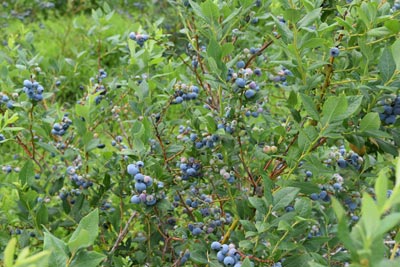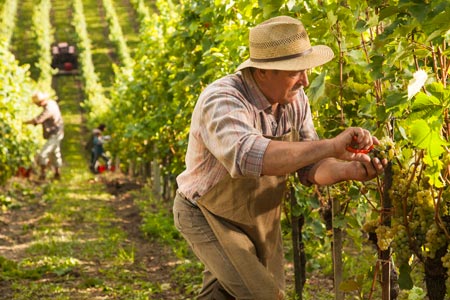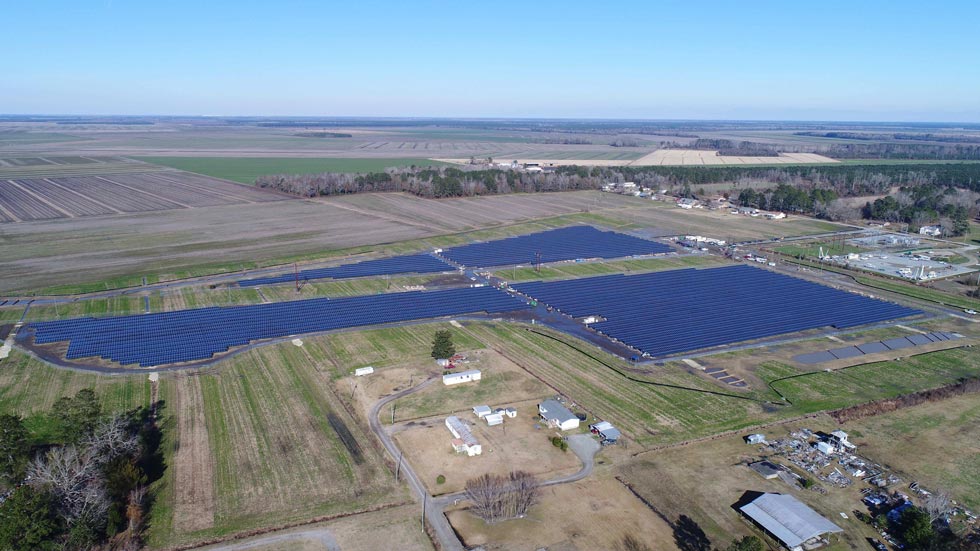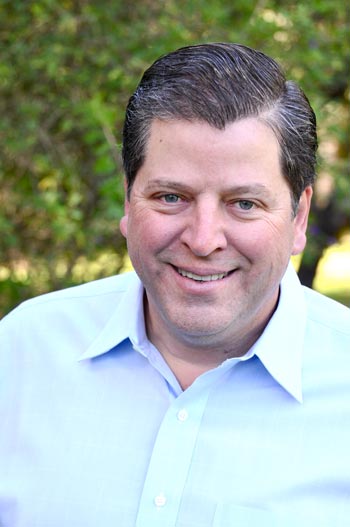Walnut farmer Jeb Headrick’s passion for agriculture is multigenerational. “I’m a fifth-generation farmer in California. My grandparents had a farm that they sold, and my father retired from working as an accountant to start a new farm from the ground up. I always wanted to work with my dad, so when I came home from college, I got started,” he says. From there, Headrick learned about walnut cultivation from working on several local farms, eventually becoming an expert in the field.
Today, his main territory is the picturesque Blue Heron Ranch, roughly 430 acres of farmland in Kings County, California. It’s a homecoming of sorts for Headrick, whose family had first purchased the ranch while he was in high school and later sold it. The orchards, an average of 17 years old, primarily produce Chandler and Tulare walnuts. “Walnut bloom is a passive event. It’s wind pollinated; yet it only happens once a year. I try to step in there and control the things I can to set up a marketable crop,” Headrick explains. “The farming year has opportunities that present themselves and if you don’t take advantage of them, it’s harder to make a profit.”
Like seizing those chances Mother Nature provides, partnering with a REIT presented a unique opportunity to Headrick. He leases these orchards from Farmland Partners Inc. (NYSE: FPI), allowing him to focus on his craft with the stability and access to capital that a REIT offers.
“Farmland Partners allowed me the opportunity to come back to where I got my start. I love growing walnuts and it’s one of the things I know how to do. It’s given me the opportunity to do that,” Headrick says.
Landlord, not a Farmer
Working with experienced U.S. farmers like Headrick is integral to Farmland Partners’ business model. The Colorado-based REIT’s expertise is in farmland markets and understanding the regions it serves. Farmland Partners currently owns more than 166,000 acres in 17 states—roughly $1.2 billion of farmland—with more than 25 different crop types and 110 separate tenants. Crops range from corn, soybeans, and citrus to almonds, pistachios, walnuts, and specialty crops like strawberries and vineyards.
“We’re absolutely passive investors in real estate. We don’t like to directly operate anything,” says Paul Pittman, chairman and CEO of Farmland Partners, discussing common misconceptions about agricultural REITs. “What we’re really looking for are high-quality tenants who have been in the business a long time with a track record of success.”

Farmland Partners’ hands-off approach in turn allows the agricultural experts to focus on their craft. “What I like about farming is being outside in the open air, working the ground, getting that sense of satisfaction from seeing what you’ve planted come to fruition,” explains Peter Navarro, vice president of family-owned Navarro Farms in Watsonville, California. Navarro is a second-generation farmer whose father came from Mexico and started growing strawberries in the 1960s. The land Navarro has leased from Farmland Partners for the last couple of years features ideal growing conditions for strawberries—foggy, cool, flat land along the coast. He says the partnership has worked out “beautifully.”
“[Farmland Partners] says ‘You’re the farmer, do what you do.’ That’s how it’s been and that’s how I like it. I’m able to come out here and work the ground as I please, and they’ve been supportive of every move that I’ve made,” Navarro says.
Crops like Navarro’s help meet increased demand for strawberries year-round. California produces roughly 80 to 90 percent of the strawberries in North America. The same is true for almonds on a global scale.
“Roughly 88 percent of the world’s almonds are grown here in California. Of the almonds grown here in California, about 70 percent are exported and 30 percent are sold here domestically,” explains Aaron Attebery, CFO of Green Leaf Farms, Inc. More than 40 years old, Green Leaf has partnered with Farmland Partners by leasing farms that grow almonds, prunes, and citrus.
Democratizing Land Ownership
According to Pittman, meeting the increased demand for food and specialty crops is core to the company. “The entire theory of our company is that global food demand is rising and food is fundamentally scarce,” Pittman says.
This is coupled with what he calls basic land scarcity, especially when it comes to high-quality farmland. Instead of investing in a single crop subject to the pitfalls of the season, market factors, or disease, Farmland Partners offers a diversified portfolio of crops.
“It gives our investors exposure to the entire suite of U.S. agricultural production,” says Cortland Barnes, Farmland Partners’ vice president of business development. “Additionally, because crop prices and yields are often uncorrelated between different regions, a broadly diversified portfolio gives our investors the most efficient ownership and portfolio of U.S. farmland.”
The REIT structure specifically allows individual investors to access this land collectively. “We really believe in the democratization of real estate ownership that comes from being a REIT and that’s why we’re structured as one,” Pittman says.
“As a publicly traded REIT, we bring individual and institutional investors into the ownership of U.S. farmland. Part of our goal in doing that is connecting investors from around the country and around the world to the values and the value of U.S. agricultural production,” Barnes adds.
According to Pittman, if the last 50 years of farming history are any indication, the long-term outlook for the company is very stable. Farmland Partners cites a range of 4 to 6 percent appreciation per annum and a similar percentage for the current yield on properties, giving total long-term returns of about 10.5 percent on the asset class with far less risk than average investment, Pittman says.
“The land itself is truly a perpetuity from an investment perspective, and we believe that being a REIT that owns land gives long-term stability to both the value of the land and to the rents we receive. Land is a very strong hedge against inflation, so we think it’s a great investment in this kind of marketplace,” he says.
Sustaining America’s Farming Heritage
Farmland Partners and its growing farm partners suggest that the REIT structure offers unique benefits to both the farmer and the investor alike by stabilizing the process.

“It’s an important piece of our structure that benefits rural America.” explains Pittman, “By us owning farms, we de-risk farmland ownership and operations for the family farmers across the country, and the reason that happens is that we’re a major long-term capital source in the form of equity underneath their businesses.” A capital-intensive business, farm operating companies can entrust large capital expenses like new reservoirs or property improvements to the REIT.
Attebery says partnering with a REIT has allowed Green Leaf to finance a substantial new irrigation system, provide more efficient water use to its orchards, redevelop orchards on a schedule to reduce lag, and ultimately gain higher yields for its trees.
“A REIT was important to us because we wanted to keep farming our ground. We have a lot of employees who work for our company–65 in total—and it was important that they stay employed by us, and we really wanted to continue that business,” Attebery says. “Partnering with a REIT allows you to do that as opposed to selling to a private company who’s maybe going to then farm it themselves.”
Among Farmland Partners’ unique holdings is Kimberly Vineyard—roughly 250 acres of grapes planted in 1998 in Monterey County that become Chardonnay and Pinot Noir for companies like J. Lohr, Constellation, and Kendall Jackson wineries. Steve McIntyre, president of Monterey Pacific Inc, a farm management company that leases the vineyard, cites Farmland’s efficiency and direct communication as two other benefits to the partnership.
“We report directly to Cortland and two other individuals. There’s a quick turnaround in terms of decision-making so it’s lean, efficient. That makes our job easier because a lot of times Mother Nature won’t wait for an answer, and we need to know now in order to get through the window before the window closes,” McIntyre says.
“It’s very reassuring as a grower that Farmland Partners will be there to help me in any aspect I need. It’s also good to know we’ll be in this spot for a long time and gives me more confidence as a farmer knowing that Farmland has that confidence in me,” Navarro says.
“By partnering with farmers, Farmland Partners, as a long-term stable owner, can allow the operators to efficiently grow their businesses using our access to public capital and their knowledge and expertise as the operators,” Barnes says.

Stewardship of the Land
Capital improvements like reservoirs and irrigation systems also help improve the overall sustainability of the farms and crops. Preserving snowmelt and rain in reservoirs for dry times and using best practices to maximize the amount of water that returns to the aquifer is key.
“Sustainability in terms of agriculture production is something that every farmer and producer believes,” Pittman says. “Food production is ultimately one of the best uses of water we can have. So, we invest in things like this reservoir that allows long-term sustainability.”
Some holdings, like Monterey Pacific’s leased vineyards, are certified by a third party and have an appointed sustainability director. McIntyre himself serves as a founder of the central coast’s Vineyard Team, established in 1994 to educate and promote sustainability initiatives.

“Sustainability is not about standards; it’s about metrics,” explains McIntyre. “Organic and other types of farming like biodynamic are subsets of sustainability primarily because organic only deals with the environment, where sustainability has three pillars: social sustainability, which is what we pay our workers and how involved we are with philanthropic endeavors and policy; financial sustainability, which we all want to experience; and then environmental sustainability.”
Cultivating Growth
Farmland Partners has grown rapidly since going public in 2014 and merging with American Farmland Company in 2017 to become the largest farmland-focused REIT.
“I always tell people that buy our stock, this is not a get-rich-quick scheme; this is a long-term hold asset,” Pittman says. “It’s the childhood story of the tortoise and the hare—farmland is the tortoise and the tortoise won that race.”
Growing the portfolio means forging more relationships and tenancies with farming communities. “By forming long-term partnerships with farmers, we allow them to grow their businesses and remain vibrant members of the communities that they operate within. As we build our portfolio, we will create more opportunities for investors to invest in high-quality U.S. farmland and work with high-quality farmers,” Barnes says.
Navarro sums up what most of Farmland Partners’ tenants believe: “We’re farmers. We just want to be out here and work the ground,” he says.